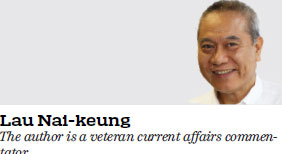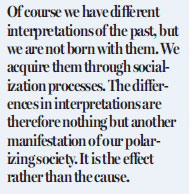HK history education needs to be reformed
Updated: 2017-01-24 07:32
By Lau Nai-keung(HK Edition)
|
|||||||
Young Hong Kong people will face an identity crisis for at least another decade because they have not been taught enough about Chinese history, Annie Wu Suk-ching, a member of the Standing Committee of the Chinese People's Political Consultative Conference National Committee, suggested. To remedy it, she called for educators to focus more on teaching Chinese history in a critical way, teaching the city's position as part of China, as well as reforming what she said was a narrow curriculum.
I support Wu 100 percent. In fact, since localism is such a big trend nowadays, we should provide Hong Kong people with proper Hong Kong history lessons.
It is interesting how poorly we understand the history of Hong Kong. For example, Professor Michael Heng wrote about "pragmatism" as Hong Kong's unique quality in the South China Morning Post. He alluded to our movie industry in the past to support his claim, saying that for many years Hong Kong "made movies in Putonghua, Teochew and Hokkien - tongues that were not spoken by the majority of the locals. It was almost like Hollywood making French and German movies."

While it was true that many movies produced back in the day were not for the local market - they were for export to Southeast Asia - the professor was wrong to assert that during that time a significant portion of the Hong Kong population did not speak dialects other than Cantonese. During and after the Japanese invasion and the Chinese Civil War, people from around the Chinese mainland fled to Hong Kong en masse. This new wave of migrants was different from those who came before them, who were mostly from around Guangdong province. With their capital, cultural sophistication and business knowhow, these new immigrants quickly became influential in Hong Kong society.
Any half-decent local history book will tell the story about the contribution of post-war migrants from the mainland to Hong Kong's rise as a manufacturing city, but we do not need history lessons to realize this. Just listen to how people such as Li Ka-shing and Tung Chee-hwa speak. Even the half-British Wong Chau-sang speaks very good Teochew. Obviously, they do not speak like they do because of some "pragmatism", as Heng alleged. They simply came from a background that's not Cantonese.

Localists tend to be narrow-minded and live in their own make-believe world. That's why renowned Taiwan writer Lung Ying-tai was surprised during a University of Hong Kong (HKU) seminar last October when the audience spontaneously sang My Motherland, one of the most beloved melodies in China since its debut in the 1956 film Battle on Shangganling Mountain.
Speaking on the theme "One Song One Era", Lung, a visiting scholar at HKU, invited the audience to name the most inspiring song in their memory.
An audience member raised his hand and answered My Motherland. Evidently surprised, Lung asked him to sing the opening lines. The request was answered by about 1,000 teachers and students at the HKU Grand Hall, who sang not just the first lines, but the entire song.
After the event, Lung wrote that she was surprised by the audience member's "honesty and courage" to say in front of 1,000 audience members that he was inspired by a so-called "red song". But she added that her view of Hong Kong was not affected by the event.
The irony is that there really was nothing to be surprised about. Just because localism is in vogue today does not mean that in the past Hong Kong people did not love their motherland. Lung, the expert on "collective memories", should understand it better than anyone else. But with typical narrow-mindedness, she refused to be affected by what does not fit into her ideology.
In one of the biggest events at the 2015 Hong Kong Book Fair, Lung gave a keynote seminar, the subject of which was remembrance and how different people, even from the same family, have different interpretations of the past. By now we are familiar with this school of thought. From the claim that the demolition of the Star Ferry was an abuse of Hong Kong people's "collective memory" to Lung's advocacy of oral history, separatists want to replace history with memories and their interpretations.
Of course we have different interpretations of the past, but we are not born with them. We acquire them through socialization processes. The differences in interpretations are therefore nothing but another manifestation of our polarizing society. It is the effect rather than the cause. Education is a powerful socialization tool, and local history lessons can help create common ground for us to interpret our past collectively.
(HK Edition 01/24/2017 page1)